Climate Control
How to Optimize Commercial Heat Pump Climate Solutions

We recognize that enhancing the efficiency of commercial heat pump climate systems might appear daunting. Yet, rest assured, we’re here to support you.
In this article, we will guide you through the process of maximizing efficiency, controlling temperature and humidity, and integrating renewable energy sources. With our data-driven approach, you’ll learn how to properly size and place heat pumps, implement smart controls, and overcome common challenges.
Get ready to serve your customers better while saving energy and reducing costs.
Key Takeaways
- Regular maintenance is crucial for efficient operation and should include tasks such as cleaning or replacing air filters, checking for refrigerant leaks, and inspecting electrical connections.
- Evaluating and maximizing efficiency of commercial heat pump systems involves comparing energy-saving features, analyzing performance metrics such as COP and SEER, and implementing energy-saving features and smart technology.
- Proper sizing, placement, and maintenance are essential for optimal performance and energy efficiency. Undersized heat pumps lead to poor performance, while oversized heat pumps waste energy. Proper placement ensures efficient airflow and minimizes energy losses.
- Optimizing temperature, humidity control, and indoor air quality in commercial spaces can be achieved through zoning, ventilation, dehumidification systems, energy recovery systems, smart thermostats, and high-efficiency filters. Integrating heat pump systems with mechanical ventilation and implementing dehumidification capabilities improve air circulation and reduce indoor pollutants.
Understanding the Basics of Commercial Heat Pump Climate Control
First, let’s understand the basics of commercial heat pump climate control. Commercial heat pump systems are essential for maintaining comfortable indoor temperatures while minimizing energy consumption. To ensure the efficient operation of these systems, regular maintenance is crucial. This includes cleaning or replacing air filters, checking for refrigerant leaks, and inspecting electrical connections. By conducting routine maintenance, potential issues can be identified and resolved promptly, preventing costly breakdowns and ensuring optimal performance.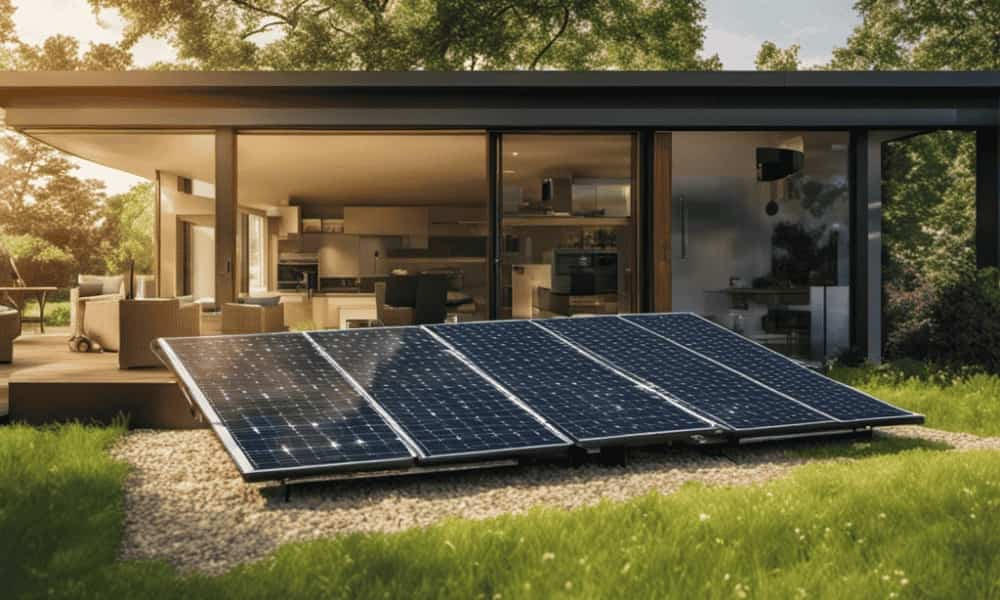
However, despite regular maintenance, troubleshooting commercial heat pump issues may still arise. Common problems include inadequate heating or cooling, unusual noises, or system malfunctions. When faced with these issues, it’s essential to consult a professional technician who can accurately diagnose and address the problem.
Understanding the basics of commercial heat pump maintenance and troubleshooting is the foundation for evaluating the efficiency of these systems. Now, let’s delve into the next section on evaluating the efficiency of commercial heat pump systems.
Evaluating the Efficiency of Commercial Heat Pump Systems
When evaluating the efficiency of commercial heat pump systems, it’s important to compare the energy-saving features of different models.
This includes analyzing the performance metrics of each system, such as the coefficient of performance (COP) and the seasonal energy efficiency ratio (SEER).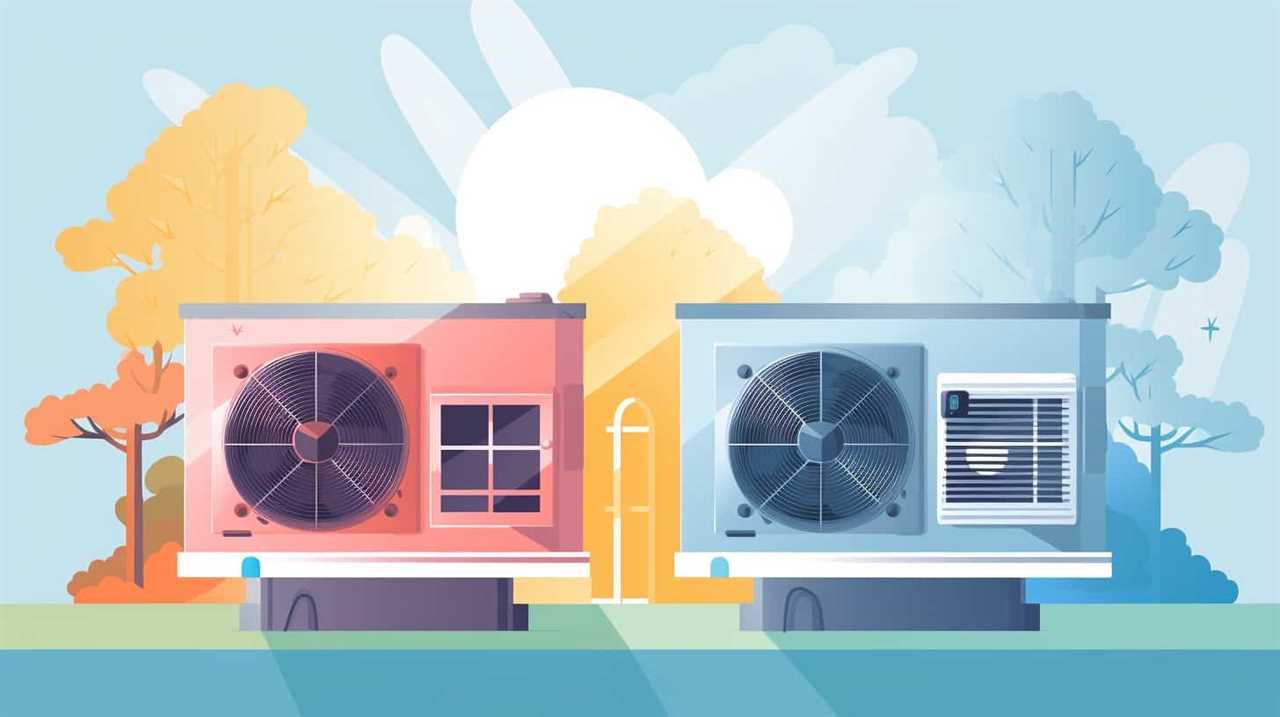
Energy-Saving Features Comparison
Evaluating the efficiency of commercial heat pump systems involves comparing their energy-saving features to determine the most optimal solution. This comparison prioritizes cost-effective implementation. One key factor to consider is the heat pump’s coefficient of performance (COP), which measures the ratio of heat output to electrical power input. A higher COP indicates better energy efficiency.
Variable speed compressors are another important feature to consider. They allow for more precise control of heating and cooling output, resulting in reduced energy consumption. Additionally, heat pump systems with advanced controls and smart technology can optimize energy usage by adjusting settings based on occupancy and environmental conditions.
By carefully analyzing and comparing these energy-saving features, we can identify the most efficient and cost-effective commercial heat pump solution.
Transitioning into the next section, we’ll now explore the evaluation of performance metrics.
Performance Metrics Evaluation
To evaluate the efficiency of commercial heat pump systems, we assess performance metrics that provide a clear understanding of their operational effectiveness. Performance analysis plays a crucial role in determining the overall performance and energy efficiency of these systems.
Key performance metrics include the Coefficient of Performance (COP), Energy Efficiency Ratio (EER), and Seasonal Energy Efficiency Ratio (SEER). These metrics help us measure the system’s ability to provide heating or cooling output in proportion to the energy input.
Data collection is essential for accurately evaluating these metrics, and it involves monitoring energy consumption, temperature differentials, and operating hours. By analyzing this data, we can identify inefficiencies, optimize system performance, and make informed decisions regarding system upgrades or replacements.
Proper evaluation of performance metrics ensures that commercial heat pump systems operate at their highest efficiency, saving energy and reducing carbon emissions.
Transitioning into the next section, let’s explore the importance of proper sizing and placement of these systems.
Proper Sizing and Placement of Commercial Heat Pumps
We need to carefully consider the appropriate size and location for commercial heat pumps to ensure optimal performance and energy efficiency. Proper sizing ensures that the heat pump can effectively meet the heating and cooling demands of the space, while proper placement ensures efficient airflow and minimizes energy losses.
When it comes to sizing, it is important to take into account factors such as the size of the space, insulation levels, and the climate of the area. An undersized heat pump will struggle to meet the demands, leading to poor performance and increased energy consumption. On the other hand, an oversized heat pump will cycle on and off frequently, wasting energy and putting unnecessary strain on the system.
Placement is equally important. The heat pump should be located in an area with good air circulation and minimal obstructions. This allows for efficient heat exchange and prevents airflow restrictions. Additionally, the heat pump should be placed away from sources of heat or cold that could interfere with its operation.
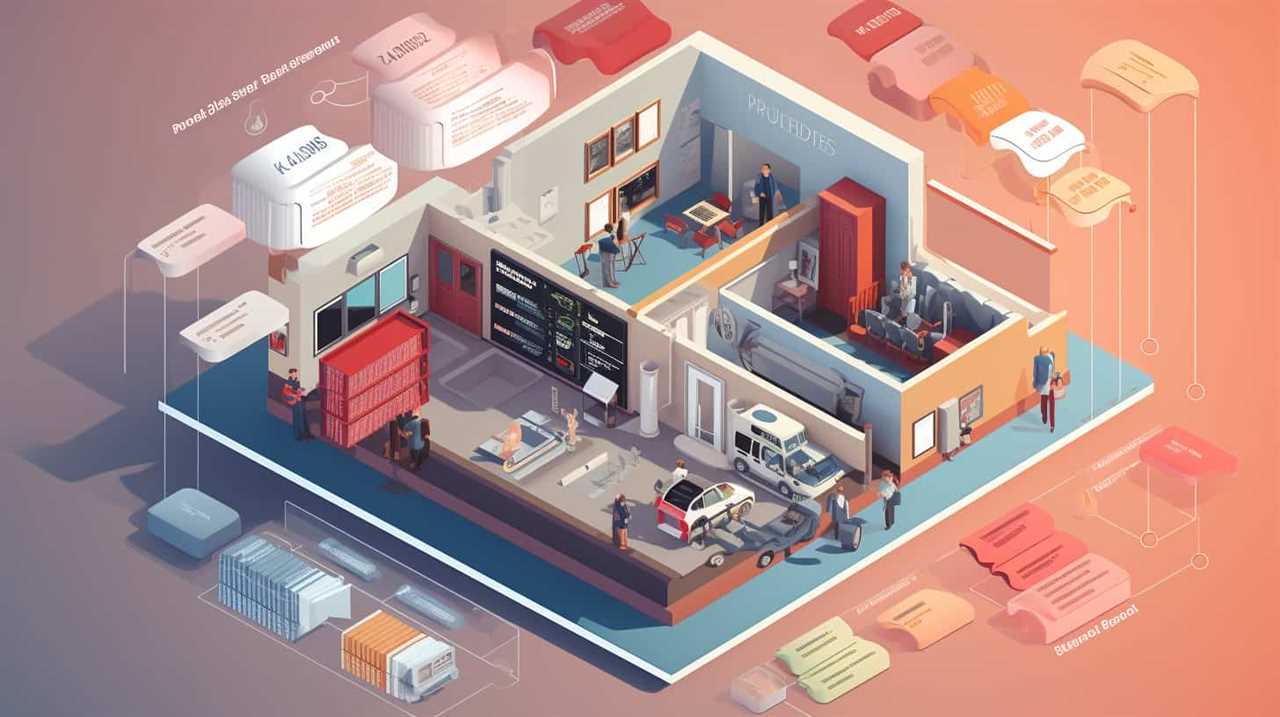
To further illustrate the importance of proper sizing and placement, consider the following table:
| Factor | Sizing Considerations | Placement Considerations |
|---|---|---|
| Space Size | Match heat pump capacity to the area | Place in an area with good airflow |
| Insulation Levels | Take into account insulation quality | Avoid obstructions |
| Climate | Consider heating and cooling demands | Keep away from heat/cold sources |
Maximizing Energy Savings With Commercial Heat Pump Climate Solutions
To maximize energy savings with commercial heat pump climate solutions, it’s important to consider cost-effective energy solutions and the environmental benefits of heat pumps.
By implementing efficient heat pumps, businesses can significantly reduce their energy consumption and lower their operating costs.
Additionally, heat pumps produce fewer greenhouse gas emissions compared to traditional heating and cooling systems, making them a more sustainable choice for commercial buildings.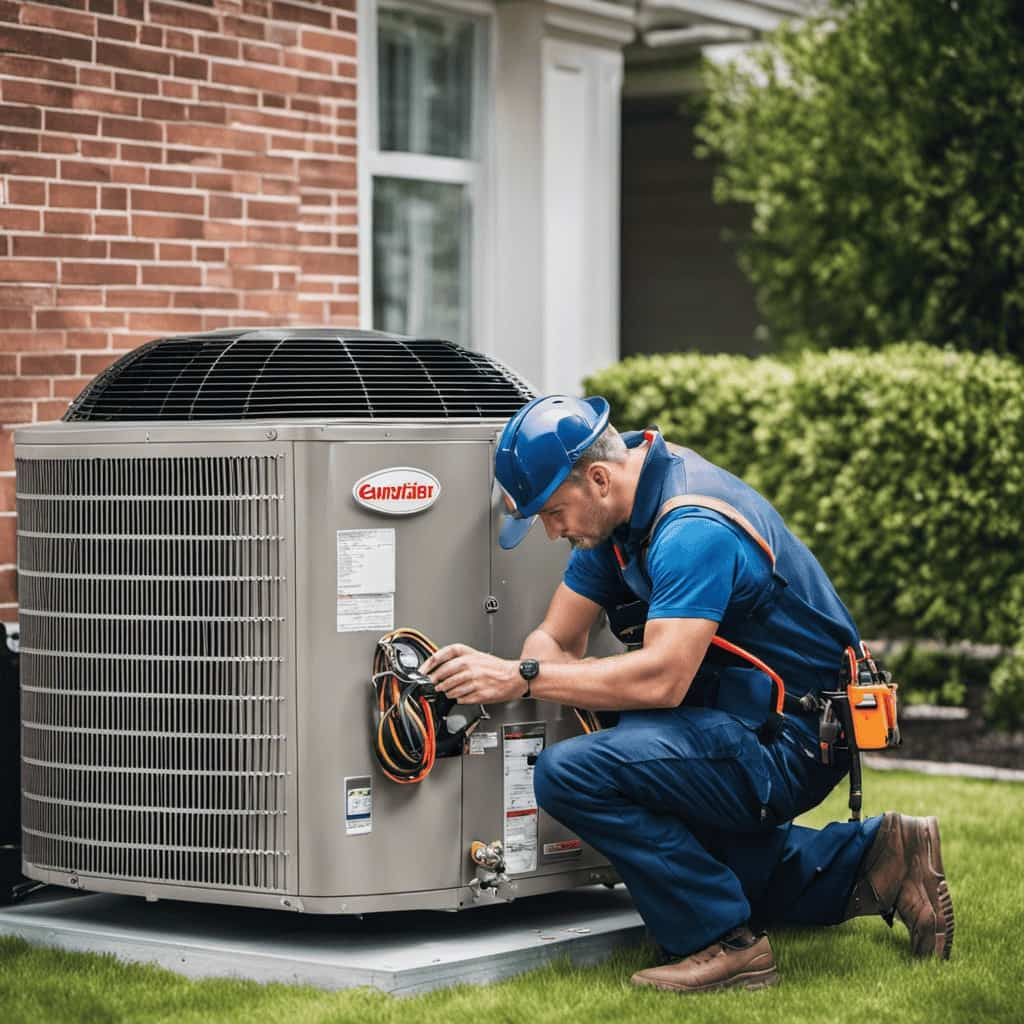
Cost-Effective Energy Solutions
By implementing commercial heat pump climate solutions, businesses can maximize energy savings and achieve cost-effective energy solutions.
One of the key factors in achieving cost-effective energy solutions is the initial cost of installation. Commercial heat pump climate solutions are known for their cost-effective installation, as they require less infrastructure and equipment compared to traditional heating and cooling systems. This not only reduces the upfront costs but also minimizes the long-term operational expenses.
Additionally, commercial heat pump climate solutions offer significant long-term savings through their high energy efficiency. These systems can provide savings of up to 30% or more compared to conventional heating and cooling systems.
Environmental Benefits of Heat Pumps
Commercial heat pump climate solutions provide significant environmental benefits by maximizing energy savings and reducing carbon emissions. These solutions are designed to be highly energy efficient, ensuring that the maximum amount of heat is extracted from the air or ground and transferred into the building.
By using renewable energy sources, such as the air or ground, heat pumps can achieve energy efficiencies of up to 400%. This means that for every unit of electricity consumed, up to four units of heat are generated.
Additionally, heat pumps produce fewer carbon emissions compared to traditional heating systems, further contributing to a reduction in greenhouse gas emissions.
Optimizing Temperature and Humidity Control in Commercial Spaces
We frequently monitor and adjust temperature and humidity levels in commercial spaces to ensure optimal control. Temperature control optimization and humidity control techniques are crucial for maintaining a comfortable and healthy indoor environment. By implementing these strategies, we can enhance occupant satisfaction and productivity while also reducing energy consumption.
To effectively optimize temperature and humidity control, it is essential to consider various factors such as space usage, occupancy levels, and external weather conditions. The table below outlines some key techniques and their benefits: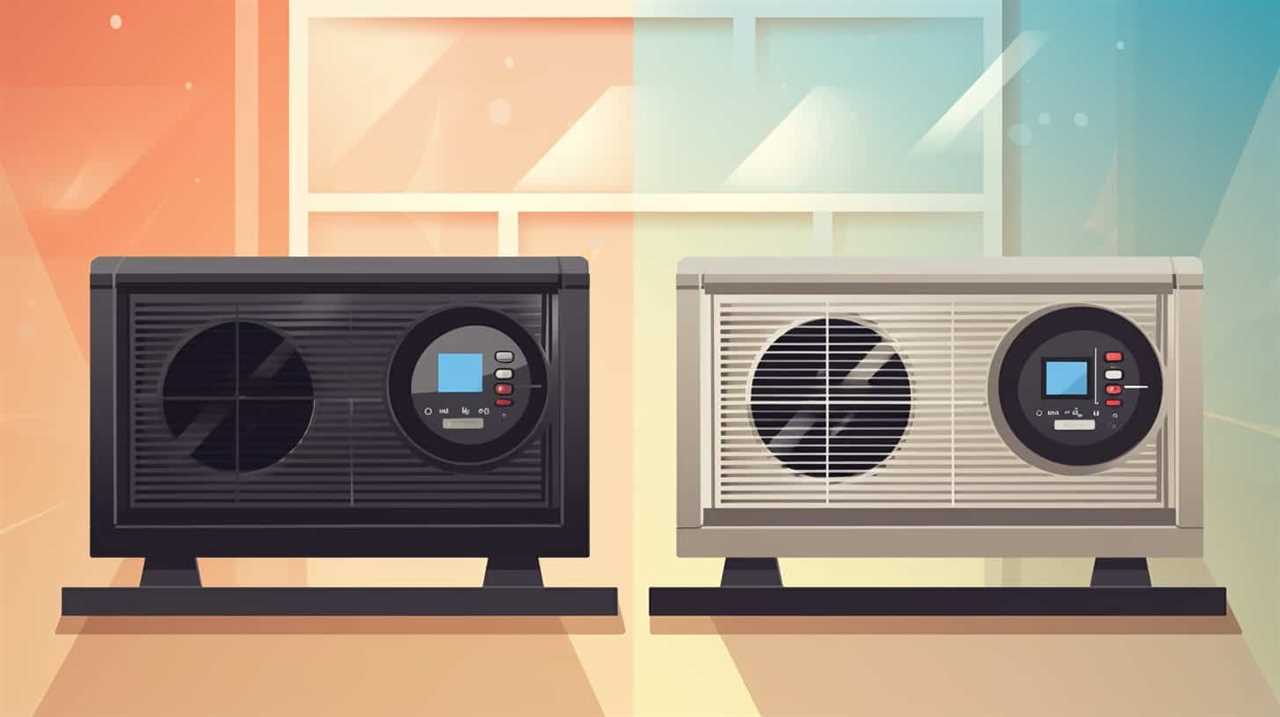
| Technique | Benefits |
|---|---|
| Zoning | Allows customized control for different areas |
| Ventilation | Enhances air quality and moisture control |
| Dehumidification systems | Reduces humidity levels for comfort |
| Energy recovery systems | Recovers energy from exhaust air |
| Smart thermostats | Provides precise control and energy savings |
Enhancing Indoor Air Quality With Commercial Heat Pump Systems
To further improve indoor air quality, it’s important to consider the integration of commercial heat pump systems with effective filtration and ventilation methods. Here are four ways commercial heat pump systems can enhance indoor air quality management and provide health benefits:
Filtration: Commercial heat pump systems equipped with high-efficiency filters can capture and remove airborne particles, such as dust, pollen, and allergens, improving air quality and reducing respiratory issues.
Ventilation: Heat pump systems can be integrated with mechanical ventilation systems that bring in fresh outdoor air and remove stale air, ensuring proper air circulation and reducing the buildup of indoor pollutants.
Dehumidification: Heat pump systems with dehumidification capabilities can control humidity levels, preventing the growth of mold and mildew, which can cause respiratory problems and allergies.
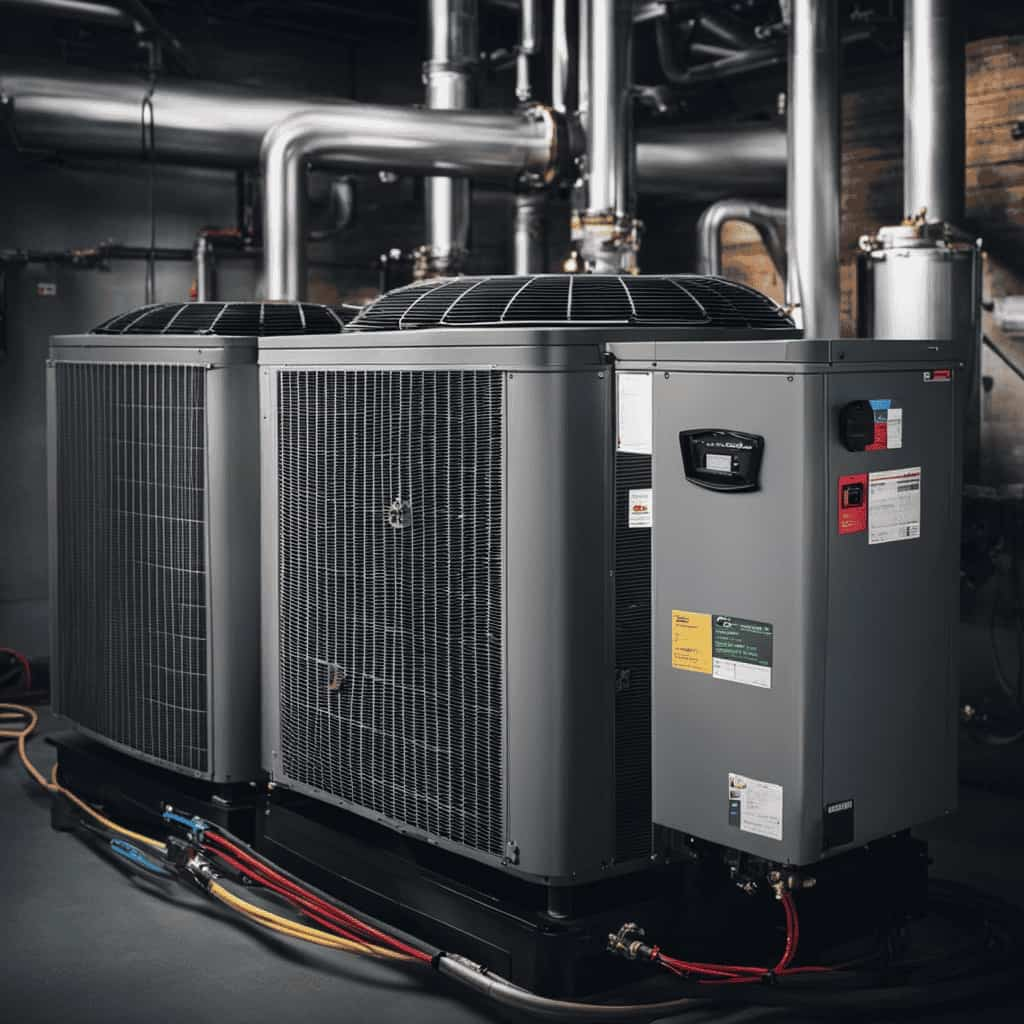
Air purification: Some commercial heat pump systems offer additional air purification technologies, such as UV germicidal lamps or electrostatic filters, to further eliminate bacteria, viruses, and other contaminants from the indoor air.
Implementing Smart Controls for Commercial Heat Pump Climate Solutions
When it comes to optimizing commercial heat pump climate solutions, implementing smart controls can offer significant benefits.
Smart controls allow for precise temperature and humidity control, which can enhance comfort and energy efficiency.
However, there are also challenges to consider, such as compatibility with existing systems and the need for proper integration.
Finding solutions to these challenges, such as selecting compatible smart control systems and working with experienced HVAC professionals, is crucial for successful implementation.
Benefits of Smart Controls
Implementing smart controls for commercial heat pump climate solutions offers numerous benefits. Here are some of the key advantages:
Enhanced energy efficiency: Smart controls optimize the operation of heat pumps, ensuring they run at their optimal capacity and reducing energy waste.
Cost savings: By monitoring and adjusting temperature settings based on occupancy and weather conditions, smart controls help minimize energy consumption, resulting in significant cost savings.

Improved comfort and productivity: Smart controls enable precise temperature control, ensuring a comfortable environment for occupants, which can enhance productivity and customer satisfaction.
Remote monitoring and control: With smart controls, facility managers can remotely monitor and adjust heat pump settings, enabling quick response to issues and reducing maintenance costs.
Implementing smart controls for commercial heat pump climate solutions not only provides tangible benefits in terms of energy efficiency and cost savings but also enhances occupant comfort and productivity. However, this implementation may come with its own set of challenges and solutions.
Implementation Challenges and Solutions
We encountered some difficulties, but we overcame them by implementing smart controls for our commercial heat pump climate solutions. When it comes to implementing smart controls, having effective implementation strategies and troubleshooting techniques is crucial. We have found that by following a systematic approach, we have been able to successfully integrate smart controls into our commercial heat pump systems.
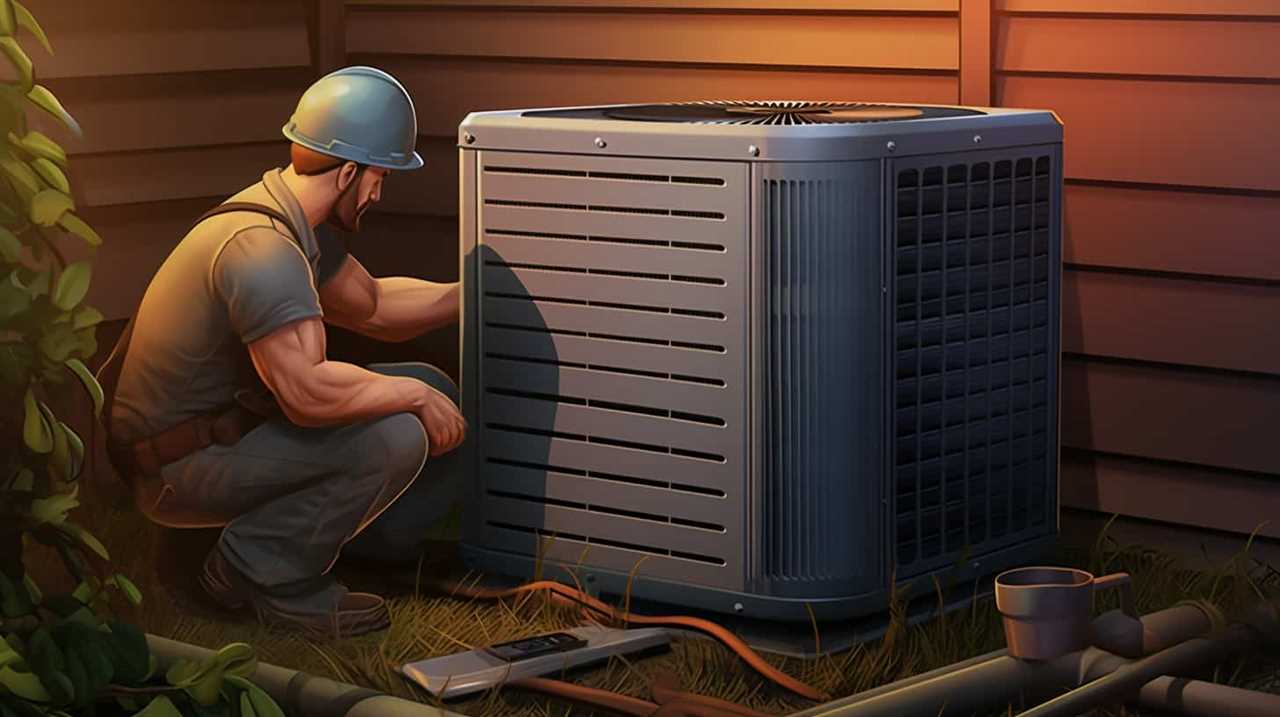
To give you a better understanding, here is a table outlining our implementation strategies and troubleshooting techniques:
| Implementation Strategies | Troubleshooting Techniques |
|---|---|
| Conduct thorough site analysis to identify specific requirements | Regularly monitor system performance and analyze data for anomalies |
| Collaborate with experts to design a tailored smart control solution | Utilize remote monitoring and diagnostics to identify and resolve issues |
| Ensure seamless integration with existing HVAC systems | Establish clear communication channels for prompt response to system alerts |
| Provide comprehensive training for facility staff on smart control operation | Maintain a comprehensive documentation of system configuration and settings |
Maintaining and Servicing Commercial Heat Pump Systems
To ensure peak performance and longevity, our team regularly maintains and services commercial heat pump systems. Here are some key servicing techniques and troubleshooting tips that we employ:
- Regular inspections:
- We conduct routine inspections to identify any potential issues before they become major problems.
- This includes checking for leaks, inspecting electrical connections, and ensuring proper airflow.
- Cleaning and filter replacement:
- We clean the heat exchanger coils and replace air filters to optimize system efficiency.
- This helps prevent debris buildup that can hinder performance.
- Lubrication and belt adjustment:
- We lubricate moving parts and adjust belts to reduce friction and ensure smooth operation.
- Refrigerant level checks:
- We monitor refrigerant levels and make adjustments when necessary.
- This helps maintain optimal performance and prevent system damage.
By following these maintenance practices, we can help maximize the efficiency and lifespan of commercial heat pump systems.
Now, let’s explore how renewable energy can be integrated with these systems to further enhance their sustainability and energy efficiency.
Exploring Renewable Energy Integration With Commercial Heat Pumps
As we delve into the topic of exploring renewable energy integration with commercial heat pumps, it’s important to consider the potential benefits and challenges that arise when incorporating sustainable energy sources into these systems.
One of the main advantages is the significant reduction in carbon footprint. By integrating renewable energy sources such as solar, wind, or geothermal power into commercial heat pump systems, businesses can greatly decrease their reliance on fossil fuels and minimize their environmental impact.
Renewable energy integration also offers long-term cost savings for businesses. With the use of renewable energy sources, the operating costs of commercial heat pumps can be significantly reduced. Additionally, government incentives and rebates are often available to businesses that adopt renewable energy solutions, further enhancing the financial benefits.
However, there are challenges to consider when integrating renewable energy with commercial heat pumps. The intermittent nature of some renewable energy sources, such as solar and wind, can pose challenges for maintaining a consistent and reliable heat pump operation. Energy storage solutions, such as batteries, can be employed to address this issue and ensure a continuous energy supply.
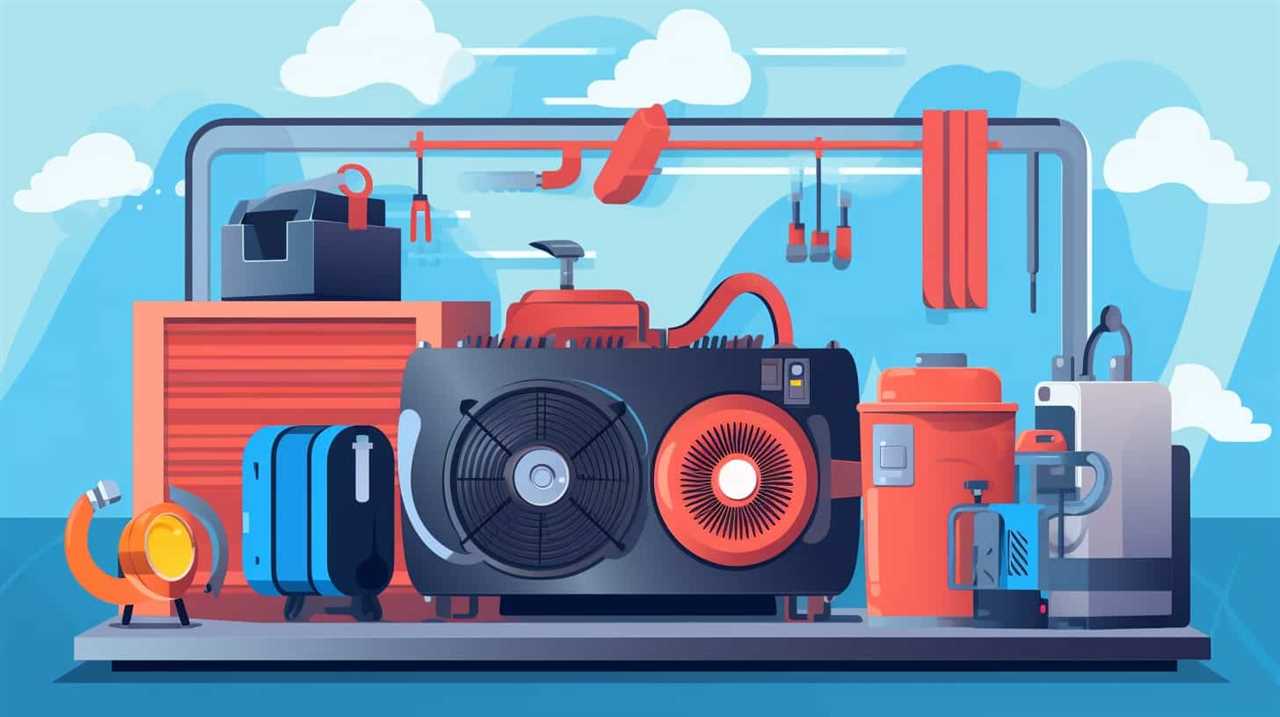
Overcoming Common Challenges in Commercial Heat Pump Climate Control
To overcome common challenges in commercial heat pump climate control, businesses must implement strategies to ensure optimal performance and efficiency.
Here are four key steps to address installation issues and troubleshoot common problems:
Proper sizing and installation: Ensure that the heat pump is correctly sized for the commercial space and installed according to manufacturer guidelines. Oversized or poorly installed units can lead to inefficiency and reduced performance.
Regular maintenance: Establish a maintenance schedule to clean and inspect the heat pump regularly. This includes cleaning or replacing air filters, checking refrigerant levels, and inspecting electrical connections.
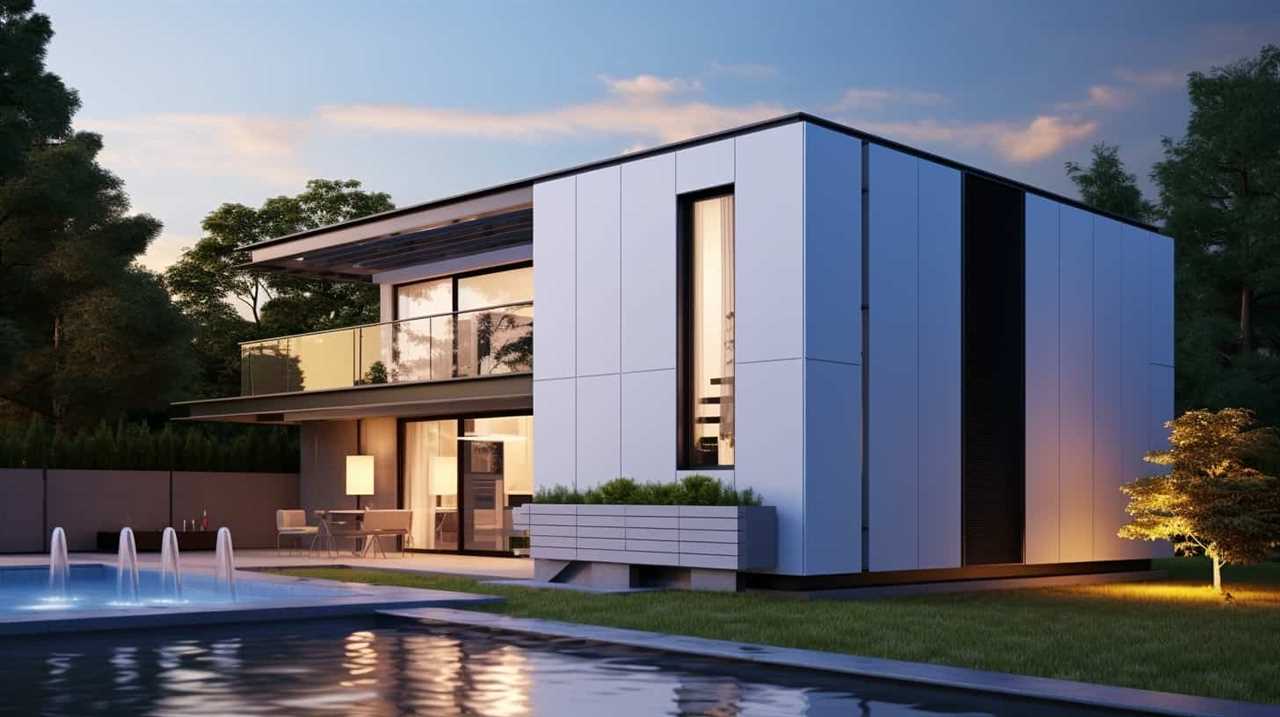
Monitoring and data analysis: Utilize smart technology to monitor the heat pump’s performance and collect data. Analyzing this data can help identify potential issues and optimize system operation.
Training and education: Provide comprehensive training to staff responsible for heat pump maintenance and operation. This ensures that they have the knowledge and skills to troubleshoot common problems and perform basic repairs.
Frequently Asked Questions
What Is the Average Lifespan of a Commercial Heat Pump System?
On average, a commercial heat pump system has a lifespan of 15-20 years. Regular maintenance is crucial to ensure optimal performance and longevity. By implementing proper maintenance requirements, we can maximize the lifespan of these systems.
Can a Commercial Heat Pump System Be Used in a Multi-Story Building?
Yes, a commercial heat pump system can be used in a multi-story building. The installation of a heat pump system offers numerous benefits for multi-story buildings, including energy efficiency and cost savings.
Are There Any Government Incentives or Rebates Available for Installing a Commercial Heat Pump System?
There are government incentives and rebates available for installing a commercial heat pump system. These incentives aim to promote energy efficiency and reduce carbon emissions. By taking advantage of these programs, businesses can save money while contributing to a greener future.
How Does a Commercial Heat Pump System Handle Extreme Weather Conditions?
Commercial heat pump systems are designed to handle extreme weather conditions while maintaining energy efficiency. They are equipped with advanced technologies that allow them to adapt and perform optimally in various climates and temperature ranges.
Can a Commercial Heat Pump System Be Used for Both Heating and Cooling Purposes Simultaneously?
Yes, a commercial heat pump system can be optimized to simultaneously provide both heating and cooling. This increases commercial heat pump efficiency and offers the benefits of year-round climate control for businesses.
What Are the Top Strategies for Commercial Heat Pump Climate Optimization?
When it comes to climate optimization with heat pumps, there are several top strategies to consider. First, it’s essential to properly size the heat pump system for the building to maximize efficiency. Additionally, optimizing the HVAC system’s controls and settings can ensure optimal temperature and humidity levels. Regular maintenance and cleaning of the heat pumps are crucial for long-term performance. Finally, integrating renewable energy sources can further enhance the overall efficiency and sustainability of commercial heat pump systems.
Conclusion
In conclusion, optimizing commercial heat pump climate solutions is crucial for maximizing energy efficiency and achieving optimal temperature and humidity control in commercial spaces.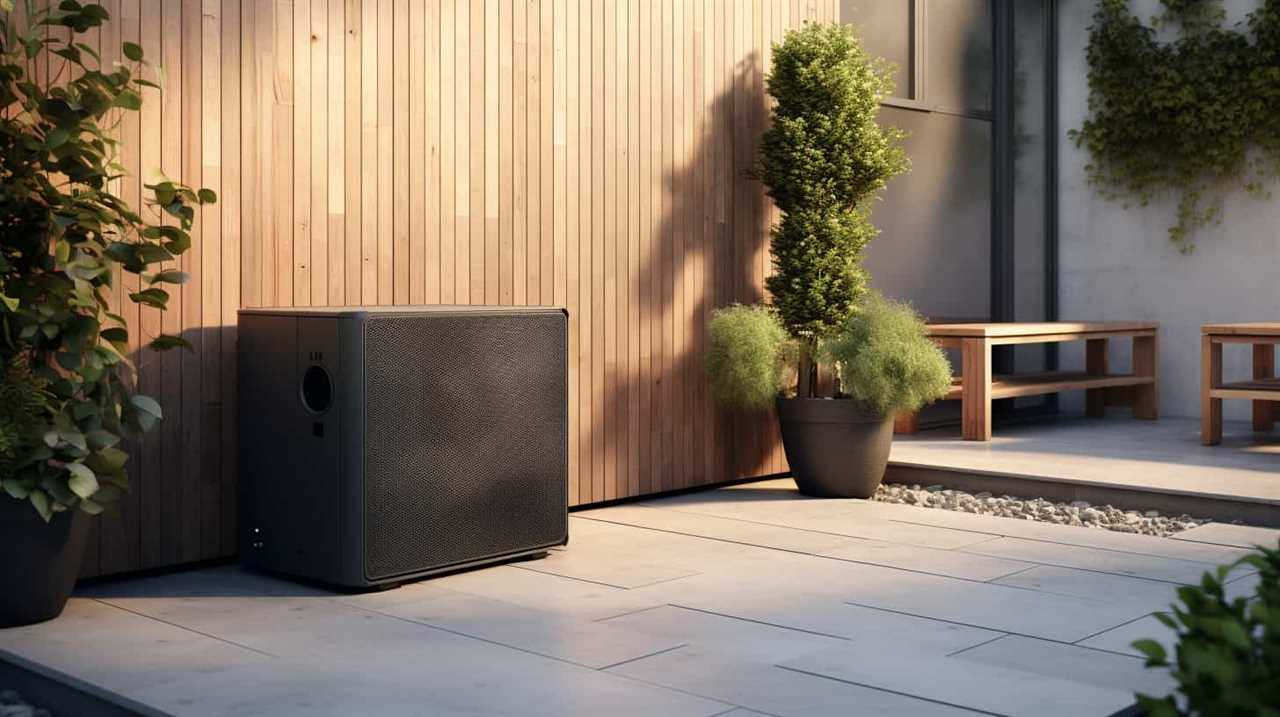
By evaluating system efficiency, properly sizing and placing heat pumps, implementing smart controls, and maintaining and servicing the systems, businesses can overcome common challenges and integrate renewable energy sources.
Just as a well-tuned instrument produces harmonious melodies, a finely optimized heat pump system orchestrates the perfect climate for commercial success.
Climate Control
Unveiling the Thrifty Power of Energy-Efficient Heat Pumps

We’ve all experienced that feeling – anxiously awaiting the arrival of our monthly energy bill, trying to find ways to save money we worked hard for.
Well, look no further. Energy-efficient heat pumps are here to revolutionize the way we think about heating our homes. With their thrifty power, these innovative devices not only reduce energy consumption but also provide substantial long-term cost savings.
Let’s dive into the world of energy-efficient heat pumps and unveil the secrets to financial success and sustainability.
Key Takeaways
- Energy-efficient heat pumps can significantly reduce monthly utility bills through their energy consumption savings.
- Conducting a cost analysis is crucial to understand the cost-effectiveness of energy-efficient heat pumps, including evaluating initial investment cost, energy savings, and payback period.
- Energy-efficient heat pumps offer financial benefits such as lower utility bills, reduced maintenance costs, and potential incentives and rebates.
- Energy-efficient heat pumps provide long-term cost savings through reduced energy consumption, lower maintenance expenses, and longer lifespan.
Cost-Effectiveness of Energy Efficient Heat Pumps
We’ve discovered that energy efficient heat pumps can significantly reduce our monthly utility bills. To truly understand the cost-effectiveness of energy efficient heat pumps, a comprehensive cost analysis is necessary.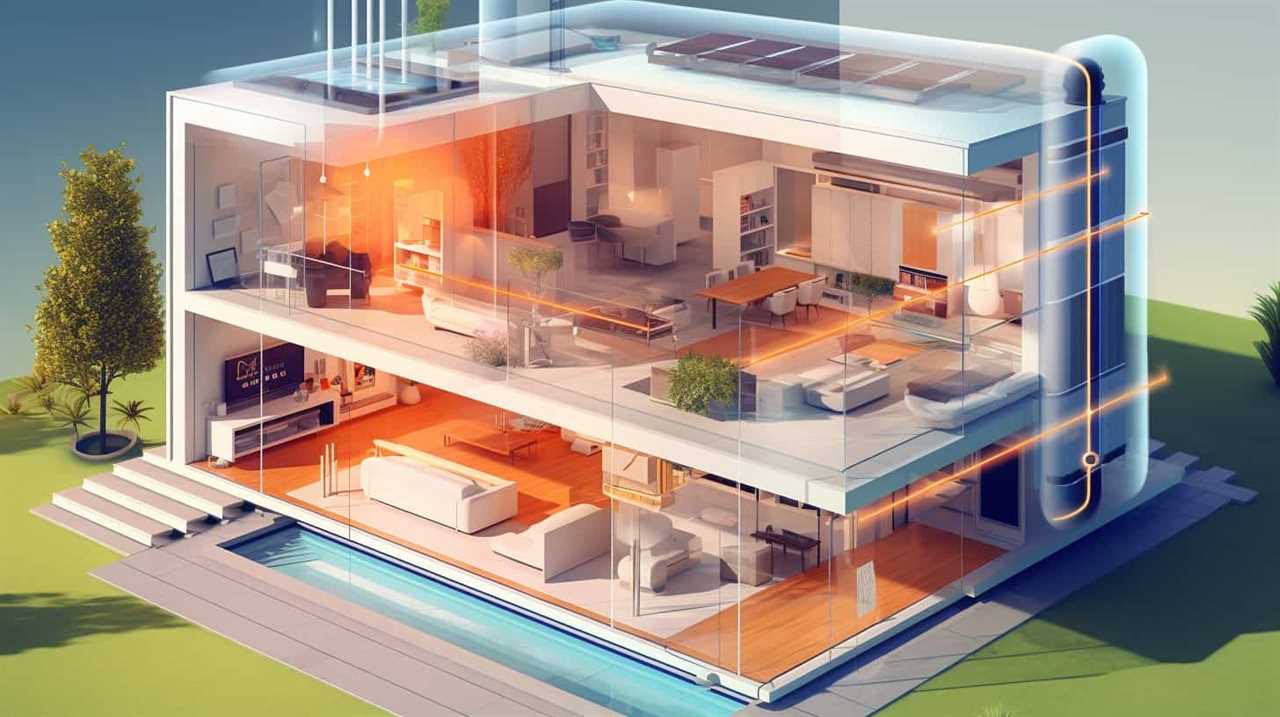
This analysis entails evaluating the initial investment cost, energy consumption savings, and the payback period. The initial investment cost includes the purchase and installation of the heat pump, as well as any necessary modifications to the existing infrastructure.
By comparing the energy consumption of energy efficient heat pumps to traditional heating systems, we can determine the potential savings over time. The payback period is the time it takes for the energy savings to offset the initial investment cost.
Through careful cost analysis, we can ascertain the financial benefits of energy efficient heat pumps and make informed decisions regarding their implementation.
Savings Potential of Energy-Efficient Heat Pumps
We can maximize our savings by utilizing energy-efficient heat pumps and making smart choices about our energy consumption. Energy-efficient heat pumps offer significant energy savings compared to traditional heating and cooling systems. By reducing energy consumption, we not only save money on our utility bills but also reduce our environmental impact.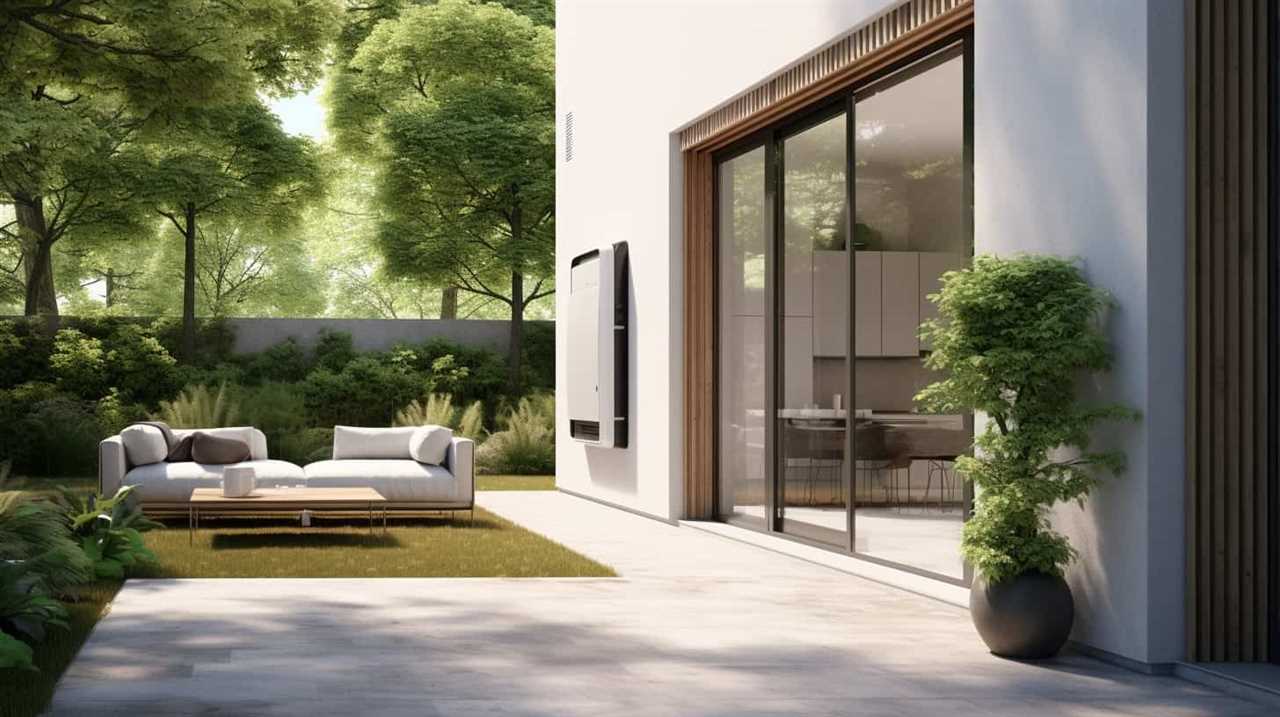
To illustrate the potential savings of energy-efficient heat pumps, let’s take a look at the following table:
| Energy Consumption | Annual Cost (Traditional System) | Annual Cost (Energy-Efficient Heat Pump) |
|---|---|---|
| Heating | $900 | $600 |
| Cooling | $800 | $500 |
| Total | $1,700 | $1,100 |
As we can see, by using energy-efficient heat pumps, we can save $600 per year on heating and $300 per year on cooling, resulting in a total annual savings of $600. Not only do these savings benefit our wallets, but they also contribute to a greener and more sustainable future.
Return on Investment for Energy-Efficient Heat Pumps
To determine the return on investment for energy-efficient heat pumps, let’s analyze the cost savings and payback period compared to traditional heating and cooling systems.
Conducting an ROI analysis is crucial in understanding the benefits of energy-efficient heat pumps and making informed decisions about their implementation.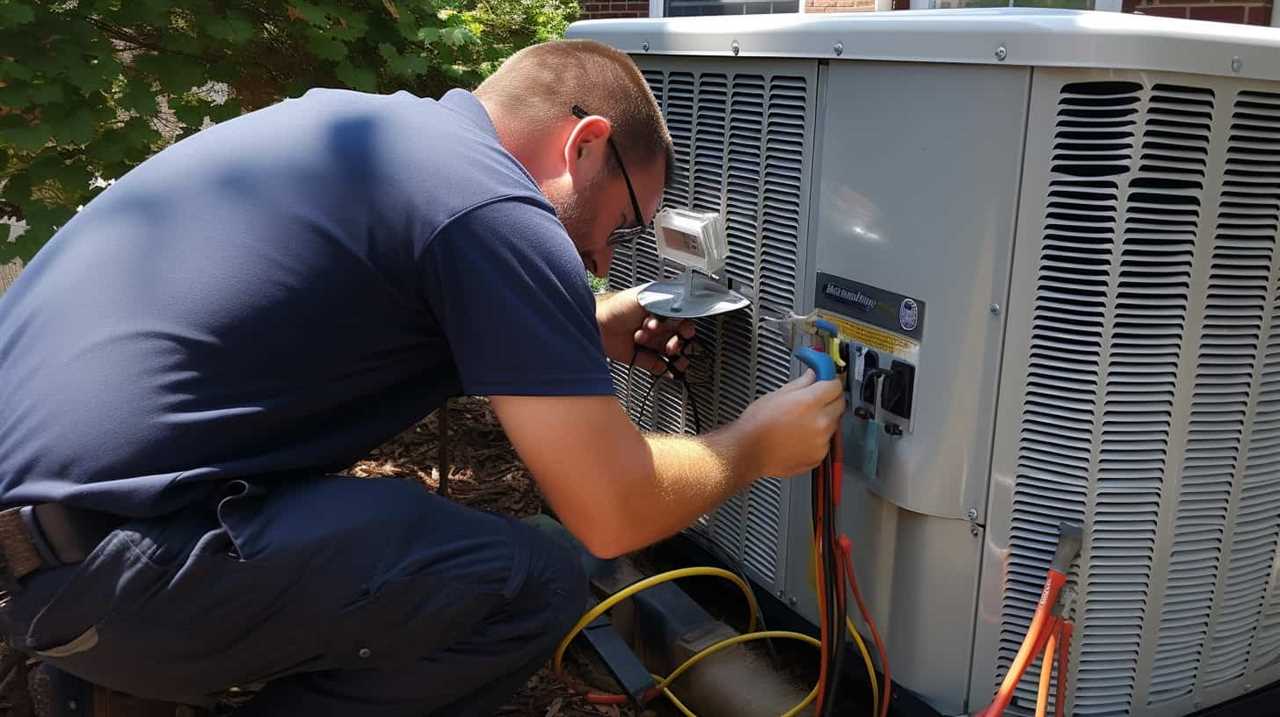
Energy-efficient heat pumps have several advantages that contribute to their positive ROI. Firstly, they consume significantly less energy compared to traditional systems, resulting in lower utility bills and operational costs.
Secondly, they’ve a longer lifespan and require less maintenance, reducing the overall expenses associated with heating and cooling.
Thirdly, energy-efficient heat pumps often qualify for various incentives and rebates, further enhancing their financial viability.
Lastly, their ability to provide both heating and cooling in a single system eliminates the need for separate units, saving on installation and equipment costs.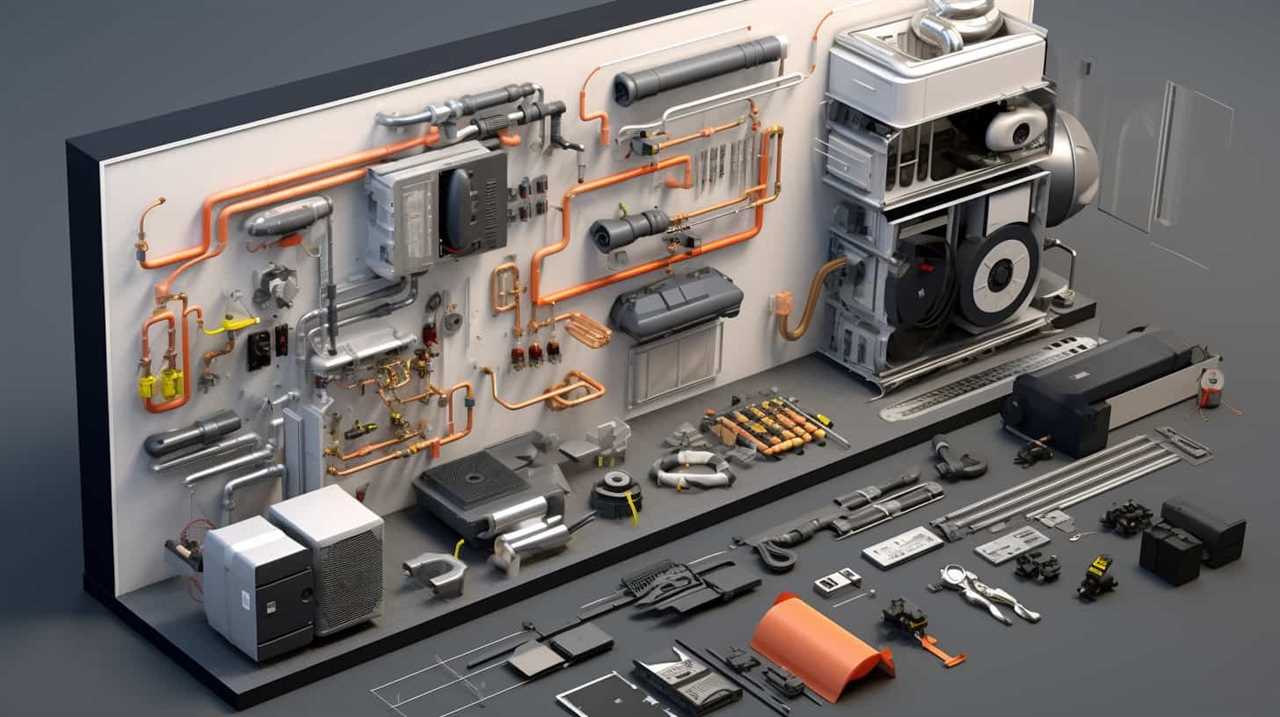
Financial Benefits of Choosing Energy-Efficient Heat Pumps
Choosing energy-efficient heat pumps provides both cost savings and environmental benefits. Not only do these heat pumps reduce energy consumption, but they also qualify for tax credits, further reducing their upfront cost. Additionally, energy-efficient heat pumps require less maintenance, leading to reduced maintenance costs in the long run.
To illustrate the financial benefits of choosing energy-efficient heat pumps, consider the following table:
| Financial Benefit | Description |
|---|---|
| Tax credits | Energy-efficient heat pumps qualify for tax credits, reducing the initial investment. |
| Reduced maintenance costs | Energy-efficient heat pumps require less maintenance, resulting in lower overall maintenance expenses. |
Long-Term Cost Savings With Energy-Efficient Heat Pumps
Over the course of several years, energy-efficient heat pumps can lead to significant long-term cost savings. Here are four reasons why investing in these pumps can result in substantial financial benefits:
Energy Efficiency: Energy-efficient heat pumps are designed to consume less electricity while providing the same level of heating or cooling. This translates to lower energy bills over time, resulting in long-term savings.

Reduced Maintenance Costs: Energy-efficient heat pumps are built with advanced technology that improves their durability and reliability. This means fewer breakdowns and repairs, leading to reduced maintenance expenses in the long run.
Government Incentives: Many governments offer incentives and rebates to encourage the use of energy-efficient appliances, including heat pumps. These financial incentives can help offset the initial investment and accelerate the payback period.
Environmental Impact: By consuming less energy, energy-efficient heat pumps contribute to reduced greenhouse gas emissions and environmental impact. This not only helps protect the planet but also positions homeowners as environmentally conscious individuals.
Frequently Asked Questions
How Does the Installation of Energy-Efficient Heat Pumps Impact the Overall Value of a Home?
Installing energy-efficient heat pumps positively impacts the overall value of our homes. They reduce energy consumption and provide long-term cost savings. These innovative systems are a smart investment for those seeking to minimize expenses and maximize efficiency.

Are There Any Government Incentives or Rebates Available for Purchasing Energy-Efficient Heat Pumps?
There are government incentives and rebates available for purchasing energy-efficient heat pumps. The installation of these pumps can also positively impact the overall value of a home.
Can Energy-Efficient Heat Pumps Be Used in Both Residential and Commercial Settings?
Yes, energy-efficient heat pumps can be used in both residential and commercial settings. A cost effectiveness analysis shows that these pumps can significantly reduce energy consumption and save money in the long run.
Are There Any Maintenance Costs Associated With Owning an Energy-Efficient Heat Pump?
Yes, there are maintenance costs associated with owning an energy-efficient heat pump. However, these costs are offset by the substantial energy savings that the heat pump provides, making it a thrifty investment in the long run.
What Are the Environmental Benefits of Using Energy-Efficient Heat Pumps Compared to Traditional Heating Systems?
Using energy-efficient heat pumps instead of traditional heating systems can lead to significant cost savings and a reduction in greenhouse gas emissions. For example, a case study showed a 40% decrease in energy consumption and a 30% decrease in carbon emissions.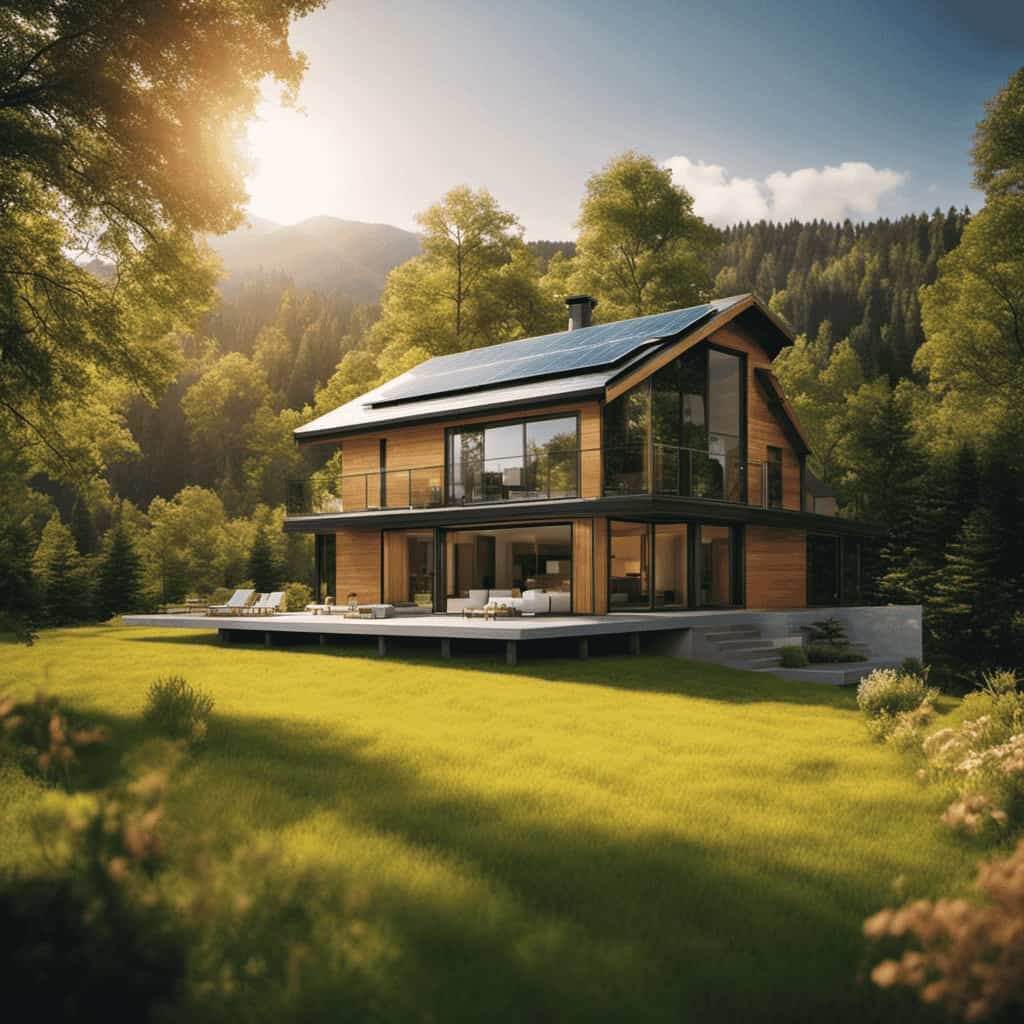
What Are the Benefits of Using Energy-Efficient Heat Pumps for Climate Control?
If you’re searching for cost-effective and environmentally friendly ways to regulate indoor climate, look no further than the perks of heat pumps for climate control. By efficiently transferring heat from one place to another, these systems provide optimal heating and cooling all year round. Enjoy reduced energy consumption, lower utility bills, and a smaller carbon footprint, all while maintaining a comfortable home temperature.
Conclusion
In conclusion, the cost-effectiveness of energy-efficient heat pumps is undeniable. With a potential savings of up to 50% on heating costs, the return on investment for these systems is impressive.
Choosing energy-efficient heat pumps not only provides financial benefits but also leads to long-term cost savings. Embracing this thrifty power can significantly impact our energy consumption and contribute to a more sustainable future.
Climate Control
History Reveals Impact of Green Heating Solutions

Have we truly taken into consideration the environmental impact of advancements in heating technology?
In this article, we delve into the history of green heating solutions and their revolutionary advances in energy efficiency.
By taking a closer look at their early adoption and the transformative effects they’ve had on the heating industry, we uncover the profound historical impact of eco-friendly solutions on environmental preservation.
Join us as we explore the fascinating journey that has shaped our present and holds the key to a liberated future.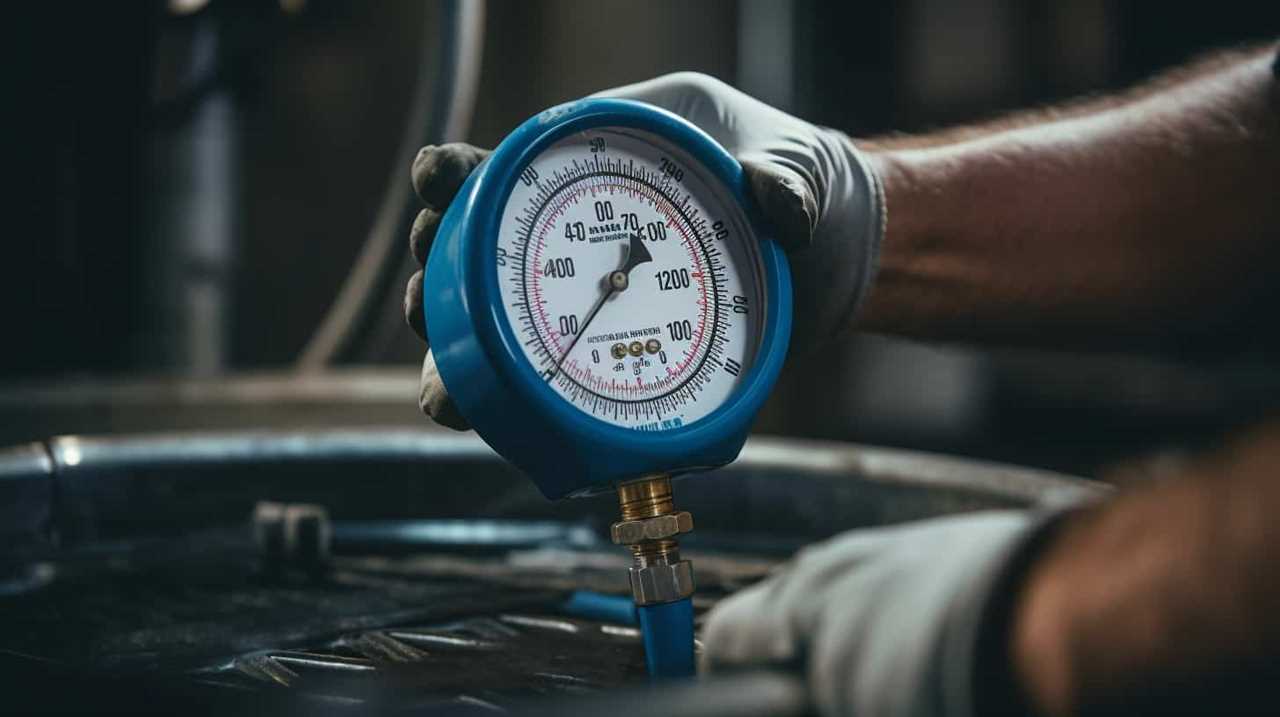
Key Takeaways
- Green heating technologies have led to a significant decrease in greenhouse gas emissions and air pollution.
- Adoption of eco-friendly heating solutions has resulted in cost savings and reduced maintenance compared to traditional systems.
- The use of renewable energy sources in heating has contributed to energy independence and reduced reliance on fossil fuels.
- Green heating practices have not only created new job opportunities in the renewable energy sector but also contributed to economic growth and societal well-being.
Evolution of Heating Technology
We have witnessed the remarkable evolution of heating technology over the years. This evolution has been driven by the growing recognition of the advantages of renewable energy and the urgent need to reduce carbon emissions.
Traditional heating systems, such as fossil fuel-based boilers, have been replaced by greener alternatives like solar panels, geothermal heating, and biomass boilers. These renewable energy solutions have had a significant impact on reducing carbon emissions, as they produce little to no greenhouse gases during operation. Furthermore, they offer long-term cost savings and reduced reliance on depletable energy sources.
The development and adoption of these green heating technologies have paved the way for a more sustainable and environmentally friendly future. As we continue to embrace renewable energy, we can expect further advancements in heating technology that will revolutionize the way we keep our homes warm while minimizing our carbon footprint.
Early Adoption of Green Heating Solutions
Our early adoption of green heating solutions paved the way for a more sustainable future. By embracing environmentally-friendly heating technologies, we haven’t only reduced our carbon footprint but also contributed to the preservation of our planet.
The following are four key benefits of our early adoption of green heating solutions:
Environmental benefits: Green heating solutions significantly decrease greenhouse gas emissions and air pollution, leading to cleaner and healthier air for everyone to breathe.
Economic advantages: Implementing green heating solutions can result in substantial cost savings, as they’re often more energy-efficient and require less maintenance compared to traditional heating systems.
Energy independence: By utilizing renewable energy sources for heating, we reduce our dependence on fossil fuels, enhancing our energy security and reducing the vulnerability to price fluctuations.

Job creation: The shift towards green heating solutions has created new employment opportunities in fields such as renewable energy installation, maintenance, and research, contributing to economic growth and societal well-being.
Revolutionary Advances in Energy Efficiency
Have recent advancements in energy efficiency revolutionized the way we heat our homes and buildings? Absolutely.
Energy saving innovations have transformed the heating industry, offering sustainable heating options that not only reduce our carbon footprint but also save us money in the long run.
One of the most significant advances is the development of smart thermostats, which allow us to control our heating systems remotely and optimize energy usage based on our schedules and preferences.

Additionally, improved insulation materials and techniques have greatly reduced heat loss in buildings, minimizing the amount of energy needed to maintain a comfortable indoor temperature.
Furthermore, the integration of renewable energy sources, such as solar panels and geothermal systems, has provided clean and efficient ways to generate heat.
These revolutionary advances in energy efficiency have empowered us to heat our homes and buildings in an environmentally conscious and cost-effective manner.
Historical Impact of Green Heating on Environmental Preservation
Over the past century, numerous green heating solutions have been implemented, leading to significant reductions in environmental damage. Green heating practices have been utilized by ancient civilizations to preserve natural resources and minimize their impact on the environment. Here are four examples of how green heating has historically contributed to environmental preservation:
Utilization of solar energy: Ancient civilizations such as the Greeks and Romans harnessed the power of the sun to heat their homes and water, reducing the need for non-renewable energy sources.
Biomass heating: Indigenous communities used biomass, such as wood and agricultural waste, as a sustainable fuel source for heating, minimizing deforestation and carbon emissions.
Geothermal heating: In regions with access to hot springs or geothermal energy, communities used this natural heat source to warm their homes, reducing reliance on fossil fuels.
Passive heating design: Ancient architects incorporated design elements like south-facing windows and thick insulation to maximize natural heating, reducing the need for artificial heating methods.

Transformation of Heating Industry Through Eco-Friendly Solutions
How can the heating industry be transformed through eco-friendly solutions?
The transformation of the heating industry through eco-friendly solutions is crucial for the sustainable future of our planet. By adopting sustainable heating options, such as geothermal, solar, and biomass heating systems, we can significantly reduce our carbon footprint and mitigate the adverse effects of climate change.
These eco-friendly heating solutions offer numerous benefits, including reduced energy consumption, lower greenhouse gas emissions, and improved indoor air quality. Additionally, they can help to reduce dependence on fossil fuels, promote energy independence, and create job opportunities in the renewable energy sector.
The adoption of such solutions won’t only benefit the environment but also result in long-term cost savings for consumers. It’s imperative for the heating industry to embrace these eco-friendly solutions to ensure a greener and more sustainable future.
Frequently Asked Questions
How Does the Evolution of Heating Technology Impact the Overall Energy Consumption in Households and Businesses?
The evolution of heating technology impacts energy consumption in households and businesses through its evolutionary trends and economic implications. It is important to analyze the overall impact and consider the potential for liberation in energy use.
What Were the Primary Reasons for the Early Adoption of Green Heating Solutions in Different Regions Around the World?
Early adoption of green heating solutions in different regions around the world was driven by a variety of factors. These included early incentives provided by governments and global policies aimed at reducing carbon emissions and promoting sustainable energy sources.
Can You Provide Examples of Revolutionary Advances in Energy Efficiency That Have Significantly Contributed to Reducing Carbon Emissions?
Revolutionary advances in energy efficiency include smart thermostats and geothermal heating. These technologies have significantly contributed to reducing carbon emissions by optimizing energy usage and utilizing renewable energy sources.
How Has the Historical Impact of Green Heating on Environmental Preservation Shaped Current Sustainability Practices and Policies?
Current sustainability practices and global environmental policies have been shaped by the long-term impact of green heating. Like a seed that grows into a mighty tree, historical preservation and the adoption of energy-efficient technology have paved the way for a greener future.
What Are Some Key Challenges Faced During the Transformation of the Heating Industry Through the Adoption of Eco-Friendly Solutions?
Challenges faced during the transformation of the heating industry through the adoption of eco-friendly solutions include high upfront costs, limited availability of green technologies, and the need for widespread consumer education. However, solutions such as government incentives and technological advancements are helping overcome these challenges.
What Are the Energy Efficiency Benefits of Heat Pumps for Climate Control?
Climate control with energy-efficient heat pumps offers numerous benefits in terms of energy efficiency. These innovative systems use minimal energy to transfer heat from one location to another, ensuring optimal climate control while minimizing energy consumption. By harnessing renewable energy sources such as air or ground, heat pumps reduce carbon emissions and provide cost-effective heating and cooling solutions. Additionally, they boast high-efficiency ratings and smart functionalities, allowing users to customize settings according to their needs and achieve maximum energy savings.
How Have HVAC Heat Pumps Evolved Over Time to Become More Energy Efficient?
The efficiency of hvac heat pumps has significantly improved over time due to technological advancements. Modern heat pumps utilize advanced compressor designs, enhanced refrigerants, and improved heat exchangers to maximize energy transfer. Additionally, advanced controls and variable-speed technology allow for better temperature regulation and reduced energy consumption. These advancements have made HVAC heat pumps much more energy-efficient, contributing to reduced energy costs and environmental impact.
Conclusion
In conclusion, the history of green heating solutions offers a fascinating journey of innovation and environmental responsibility. From the early adoption of eco-friendly technologies to the revolutionary advances in energy efficiency, the impact of these solutions on environmental preservation has been profound.
The transformation of the heating industry through sustainable practices hasn’t only reduced carbon emissions but also paved the way for a greener future. As the saying goes, ‘Every little bit helps,’ and green heating solutions have certainly made a significant contribution.
Climate Control
Benefits of Eco-Friendly Heat Pumps for Sustainable Homes

Do you feel like you always have to choose between comfort and environmental friendliness? Well, your search ends here!
Our eco-friendly heat pumps are the solution you’ve been searching for. With their energy-efficient technology, these heat pumps reduce energy consumption while keeping your home cozy and warm.
And the best part? You’ll also enjoy significant cost savings and contribute to a greener future by reducing carbon emissions.
Experience the benefits of sustainable living with our reliable and long-lasting heat pump systems.
Key Takeaways
- Eco-friendly heat pumps significantly decrease energy consumption in homes, leading to lower electricity bills and reduced carbon footprint.
- Installing eco-friendly heat pumps can increase the value of a home and may be eligible for financial incentives and rebates from the government.
- Eco-friendly heat pumps actively reduce carbon emissions and contribute to mitigating climate change by harnessing renewable energy sources.
- These heat pumps provide improved comfort, air quality, and durability, offering precise temperature control and even distribution of heat or cool air throughout the home.
Energy Efficiency: How Eco-Friendly Heat Pumps Can Help in Reducing Energy Consumption
Using eco-friendly heat pumps can significantly decrease energy consumption in our homes. These heat pumps utilize advanced technology to efficiently transfer heat from one area to another, resulting in substantial energy savings. According to studies, eco-friendly heat pumps can reduce energy consumption by up to 50% compared to traditional heating systems. This translates to lower electricity bills and a reduced carbon footprint.
The environmental benefits of using eco-friendly heat pumps are substantial. By consuming less energy, we can contribute to the preservation of natural resources and mitigate the effects of climate change. Additionally, these heat pumps don’t emit harmful greenhouse gases, further enhancing their eco-friendly nature.
Cost Savings: the Financial Benefits of Using Eco-Friendly Heat Pumps in Sustainable Homes
We can achieve significant cost savings by installing eco-friendly heat pumps in our sustainable homes. Not only are these heat pumps highly energy efficient, but they also provide a great return on investment in terms of financial savings.
Here are three reasons why eco-friendly heat pumps are a smart financial choice for sustainable homes:
Lower energy bills: Eco-friendly heat pumps are designed to consume less energy, resulting in lower monthly utility bills. This can lead to substantial long-term savings.
Government incentives: Many governments offer financial incentives and rebates for homeowners who install eco-friendly heat pumps. Taking advantage of these incentives can further reduce the upfront costs and increase the financial benefits.
Increased property value: Installing eco-friendly heat pumps can increase the value of your home. Potential buyers are increasingly interested in sustainable features, which can translate into higher resale value.
Environmental Impact: How Eco-Friendly Heat Pumps Contribute to Reducing Carbon Emissions
Eco-friendly heat pumps actively reduce carbon emissions and contribute to a more environmentally sustainable future. By harnessing renewable energy sources, such as the heat from the ground or the air, these heat pumps provide a highly efficient and sustainable heating solution for homes.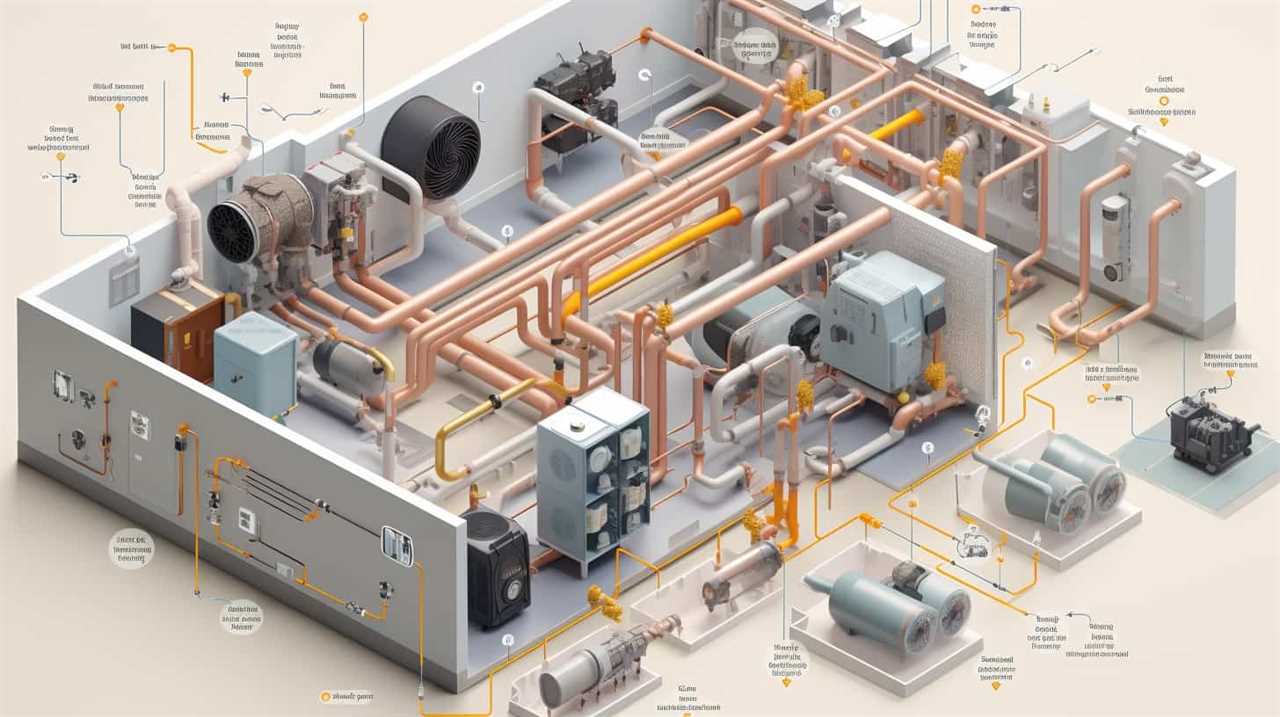
Traditional heating systems, such as gas or oil boilers, rely on burning fossil fuels which release carbon dioxide into the atmosphere, contributing to climate change. In contrast, eco-friendly heat pumps operate by transferring heat rather than generating it, resulting in significantly reduced carbon emissions.
According to studies, heat pumps can reduce carbon emissions by up to 50% compared to conventional heating systems. This reduction in greenhouse gas emissions plays a crucial role in mitigating climate change and achieving a more sustainable future.
Comfort and Indoor Air Quality: the Improved Comfort and Air Quality Benefits of Eco-Friendly Heat Pumps
For homeowners, the improved comfort and air quality benefits of eco-friendly heat pumps become evident immediately after installation. These heat pumps not only provide efficient heating and cooling, but they also contribute to a healthier and more comfortable indoor environment. Here are the key benefits:
Improved Health: Eco-friendly heat pumps help maintain a consistent temperature and humidity level, reducing the risk of mold, allergens, and respiratory issues. This promotes better respiratory health and overall well-being.

Energy Savings: By utilizing renewable energy sources, such as geothermal or air-source heat pumps, homeowners can significantly reduce their energy consumption and lower utility bills. This not only benefits the environment but also saves money in the long run.
Enhanced Comfort: Eco-friendly heat pumps offer precise temperature control and even distribution of heat or cool air throughout the home. This eliminates hot and cold spots, ensuring a comfortable living environment for all occupants.
Investing in eco-friendly heat pumps not only saves energy and money but also improves the health and comfort of your home.
Long-Term Durability: the Longevity and Reliability of Eco-Friendly Heat Pumps for Sustainable Homes
With proper maintenance and regular inspections, eco-friendly heat pumps can provide homeowners with long-term durability, ensuring their longevity and reliability for sustainable homes.
The longevity benefits of eco-friendly heat pumps stem from their advanced technology and high-quality components. These heat pumps are designed to withstand rigorous usage and harsh environmental conditions, making them a reliable choice for homeowners seeking sustainable solutions.
The reliability advantages of eco-friendly heat pumps can be attributed to their efficient performance and minimal downtime. By utilizing renewable energy sources such as air, water, or ground heat, these heat pumps reduce dependence on fossil fuels and contribute to a more sustainable future.
Additionally, eco-friendly heat pumps are engineered to deliver consistent and reliable heating, cooling, and hot water supply throughout the year, ensuring a comfortable living environment for homeowners while minimizing energy consumption.
Frequently Asked Questions
Are There Any Government Incentives or Rebates Available for Installing Eco-Friendly Heat Pumps in Sustainable Homes?
There are government incentives and financial assistance available for installing eco-friendly heat pumps in sustainable homes. These incentives provide a cost-effective solution for homeowners and contribute to the overall goal of creating a more sustainable future.
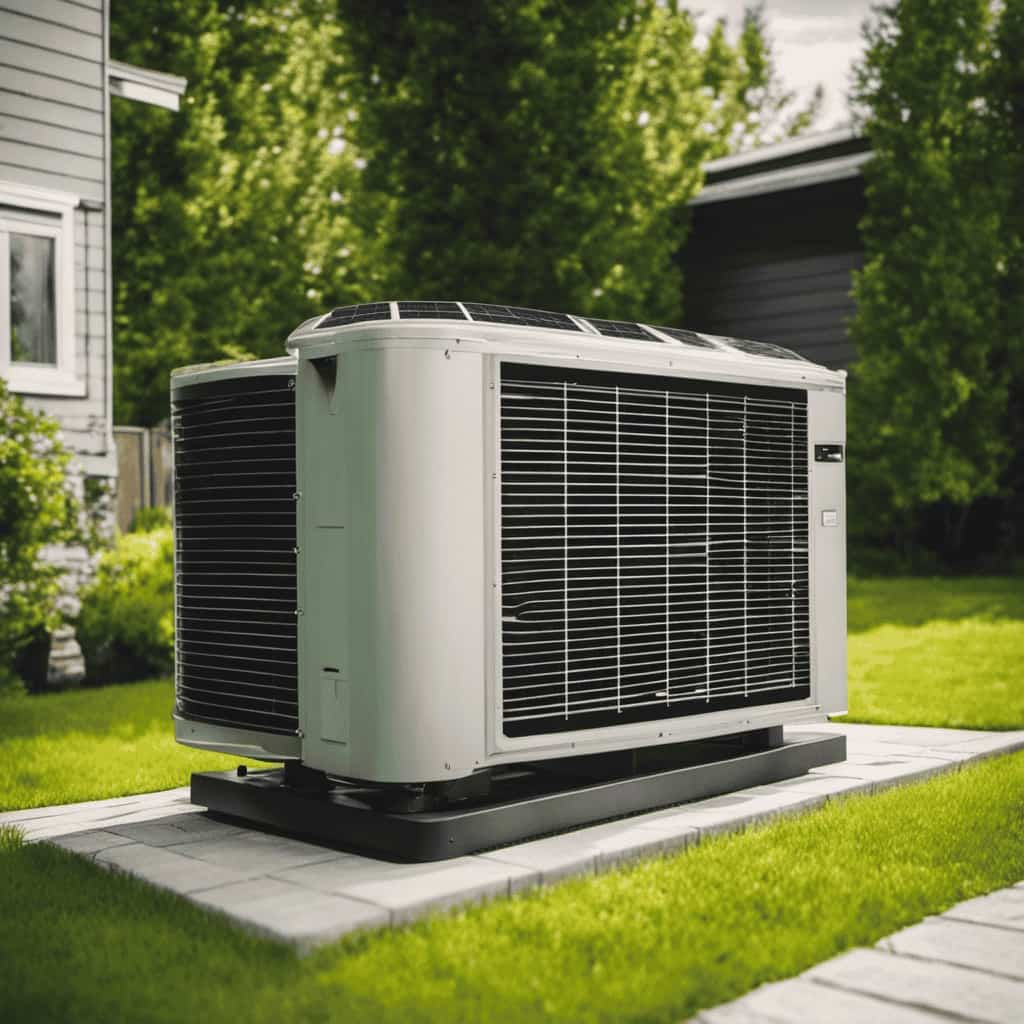
Can Eco-Friendly Heat Pumps Be Used in All Types of Homes, Including Older or Historic Buildings?
Yes, eco-friendly heat pumps can be used in all types of homes, including older or historic buildings. There are benefits to retrofitting older homes with eco-friendly heat pumps, and they can also be incorporated into new construction.
How Do Eco-Friendly Heat Pumps Compare to Traditional Heating and Cooling Systems in Terms of Maintenance Requirements?
When comparing eco-friendly heat pumps to traditional heating and cooling systems, we find that they require less maintenance. This means they are more energy efficient and cost effective in the long run.
Are There Any Potential Health Risks Associated With Using Eco-Friendly Heat Pumps, Such as Exposure to Refrigerants or Allergens?
There are potential health risks associated with using eco-friendly heat pumps, such as exposure to refrigerants. However, proper installation, maintenance, and ventilation can greatly reduce these risks and ensure a healthy and safe environment for sustainable homes.
Can Eco-Friendly Heat Pumps Be Used in Conjunction With Other Renewable Energy Sources, Such as Solar Panels or Wind Turbines, to Further Reduce Energy Consumption and Carbon Emissions?
Yes, eco-friendly heat pumps can be integrated with other renewable energy sources like solar panels and wind turbines to further reduce energy consumption and carbon emissions. This integration enhances the sustainability and efficiency of the overall energy system.
What Are the Environmental Benefits of Heat Pumps for Climate Control?
Heat pumps offer a multitude of environmental benefits for climate control. By harnessing the energy present in the air or ground, these systems minimize reliance on fossil fuels, significantly reducing carbon emissions. Additionally, they are highly efficient, using minimal electricity to transfer heat from one area to another. This not only saves energy but also lowers utility bills. Embracing the benefits of heat pumps for climate control is an important step in prioritizing sustainability and combatting climate change.
Conclusion
In conclusion, eco-friendly heat pumps offer a multitude of benefits for sustainable homes. These efficient systems not only reduce energy consumption, resulting in cost savings, but also contribute to the reduction of carbon emissions, promoting a greener environment.
Additionally, they enhance comfort levels and indoor air quality, ensuring a healthier living space. With their long-term durability, eco-friendly heat pumps prove to be reliable solutions for sustainable homes, providing a reliable and efficient heating and cooling option for years to come.
-

 Residential and Commercial Applications1 week ago
Residential and Commercial Applications1 week agoBest Amana Heat Pump Reviews
-

 Thermal Energy Transfer2 weeks ago
Thermal Energy Transfer2 weeks agoBreakthroughs in Modern Heat Pump Systems: Thermal Energy Edition
-

 Residential and Commercial Applications1 week ago
Residential and Commercial Applications1 week agoBest Heat Pump
-

 Geothermal Heat Pumps3 months ago
Geothermal Heat Pumps3 months agoUpgrade Your Comfort with Our Efficient HVAC Systems
-

 Air Conditioning2 months ago
Air Conditioning2 months agoExploring Energy-Efficient Air Conditioning Heat Pumps
-

 Geothermal Heat Pumps3 months ago
Geothermal Heat Pumps3 months agoInnovative Geothermal Heat Pump Manufacturers Revolutionize Energy Efficiency
-

 Thermal Energy Transfer1 month ago
Thermal Energy Transfer1 month agoBoost Your Heat Pump Efficiency: Interactive Guide
-

 Residential and Commercial Applications1 week ago
Residential and Commercial Applications1 week agoBest Portable Heat Pump Heat & AC










